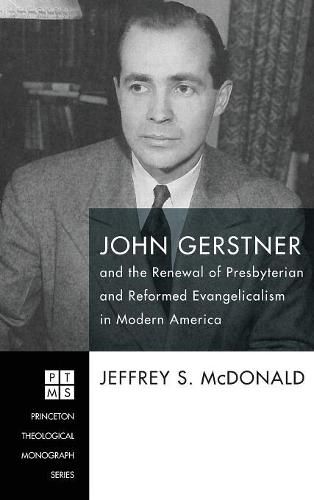Readings Newsletter
Become a Readings Member to make your shopping experience even easier.
Sign in or sign up for free!
You’re not far away from qualifying for FREE standard shipping within Australia
You’ve qualified for FREE standard shipping within Australia
The cart is loading…






This title is printed to order. This book may have been self-published. If so, we cannot guarantee the quality of the content. In the main most books will have gone through the editing process however some may not. We therefore suggest that you be aware of this before ordering this book. If in doubt check either the author or publisher’s details as we are unable to accept any returns unless they are faulty. Please contact us if you have any questions.
John Gerstner (1914-96) was a significant leader in the renewal of Presbyterian and Reformed evangelicalism in America during the second half of the twentieth century. Gerstner’s work as a church historian sought to shape evangelicalism, but also northern mainline Presbyterianism. In order to promote evangelical thought he wrote, taught, lectured, debated, and preached widely. In pursuing his aims he promoted the work of the great colonial theologian Jonathan Edwards. He also defended and endorsed biblical inerrancy and the Old Princeton theology. Gerstner was a sharp critic of theological modernism and what he considered its negative influence on the church. Part of Gerstner’s fame was his active participation in mainline Presbyterianism and in so many of the smaller Presbyterian denominations and in the wider evangelical movement. His renewal efforts within the United Presbyterian Church USA (later PCUSA) were largely a failure, but they did contribute to the surprising resurgence of Presbyterian and Reformed evangelicalism. Evangelical marginalization in the mainline led Gerstner and other evangelicals to redirect their energy into new evangelical institutions, groups, and denominations. Gerstner’s evangelical United Presbyterian Church of North America (UPCNA) background influenced the young scholar and the legacy of the UPCNA’s heritage can be detected in the popular forms of the Presbyterian and Reformed evangelical movement that exist today. Moreover, he was significant for the revival of Reformed teaching beyond the bounds of Presbyterianism. This book establishes Gerstner’s significance in American church history and provides a thorough analysis of the evangelical movement he sought to reinvigorate.
$9.00 standard shipping within Australia
FREE standard shipping within Australia for orders over $100.00
Express & International shipping calculated at checkout
This title is printed to order. This book may have been self-published. If so, we cannot guarantee the quality of the content. In the main most books will have gone through the editing process however some may not. We therefore suggest that you be aware of this before ordering this book. If in doubt check either the author or publisher’s details as we are unable to accept any returns unless they are faulty. Please contact us if you have any questions.
John Gerstner (1914-96) was a significant leader in the renewal of Presbyterian and Reformed evangelicalism in America during the second half of the twentieth century. Gerstner’s work as a church historian sought to shape evangelicalism, but also northern mainline Presbyterianism. In order to promote evangelical thought he wrote, taught, lectured, debated, and preached widely. In pursuing his aims he promoted the work of the great colonial theologian Jonathan Edwards. He also defended and endorsed biblical inerrancy and the Old Princeton theology. Gerstner was a sharp critic of theological modernism and what he considered its negative influence on the church. Part of Gerstner’s fame was his active participation in mainline Presbyterianism and in so many of the smaller Presbyterian denominations and in the wider evangelical movement. His renewal efforts within the United Presbyterian Church USA (later PCUSA) were largely a failure, but they did contribute to the surprising resurgence of Presbyterian and Reformed evangelicalism. Evangelical marginalization in the mainline led Gerstner and other evangelicals to redirect their energy into new evangelical institutions, groups, and denominations. Gerstner’s evangelical United Presbyterian Church of North America (UPCNA) background influenced the young scholar and the legacy of the UPCNA’s heritage can be detected in the popular forms of the Presbyterian and Reformed evangelical movement that exist today. Moreover, he was significant for the revival of Reformed teaching beyond the bounds of Presbyterianism. This book establishes Gerstner’s significance in American church history and provides a thorough analysis of the evangelical movement he sought to reinvigorate.